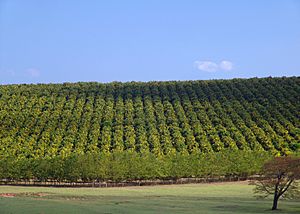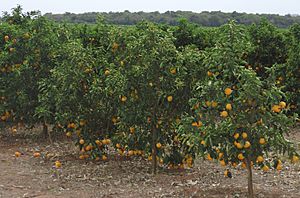Orange production in Brazil facts for kids
Brazil is a very important country when it comes to growing oranges. It's one of the biggest producers of this popular fruit in the world!
History of Oranges in Brazil
Oranges first came to Brazil a long time ago, around the year 1530. They were brought by the Portuguese people who settled there.
Orange Production in Brazil
Brazil grows a huge amount of oranges. In 2013, farmers harvested oranges from over 700,000 hectares of land. That's a lot of orange groves!
Brazil is also the world's top country for sending orange juice to other countries. For example, in 2012, Brazil shipped out 1.2 million tons of orange juice. That's 12 times more than the United States, which is the second-largest exporter!
Sometimes, growing oranges can be tough for farmers. In 2013, many Brazilian orange growers started planting other crops like sugarcane instead. This happened because the price they got for their oranges went down. Also, the costs for workers and special chemicals went up. One big reason for lower prices was that Brazil had two really good orange harvests in a row. This meant there were lots of oranges available, which made prices drop around the world.
The state of São Paulo grows the most oranges in Brazil. In 2019, São Paulo produced over 13 million tons of oranges. This was about 78% of all the oranges grown in Brazil that year! It was even more than what China, the world's second-largest orange producer, grew. Other states that grow many oranges include Minas Gerais, Paraná, Bahia, and Sergipe.
A few big Brazilian companies handle most of the orange juice that is sent out of the country. These include Citrosuco, Sucocitrico Cutrale Ltda, and Louis Dreyfus Commodities Brasil SA. Together, these companies are involved in about 40% of Brazil's orange production. They also handle almost all of Brazil's orange juice exports. Because these few companies are so big, it can sometimes affect the prices farmers get for their oranges.
For example, the average price farmers received for a box of oranges dropped quite a bit between 2007 and 2013.
Fair Treatment of Workers
It's important that workers who pick oranges are treated fairly. Sometimes, in large-scale farming, there can be problems with how workers are treated.
In 2015, some groups reported that workers on an orange farm in Brazil were not being paid for several weeks. These workers were also being charged high prices for their travel, housing, and food by the people who hired them. This meant the workers ended up owing money and couldn't afford to leave the farm.
Groups that work to protect people's rights said that this situation was not fair to the workers. The Brazilian government's Ministry of Labour and Employment has a list of companies that have had problems with worker treatment. They investigate to make sure companies follow the rules.
Authorities in São Paulo state have looked into the practices of big orange juice companies many times. They want to make sure workers are treated well and paid correctly. Sometimes, companies are asked to improve their practices and pay what was owed to workers. For instance, in 2014, a court asked Cutrale and two other companies to pay money and stop using unfair ways to hire orange pickers.



